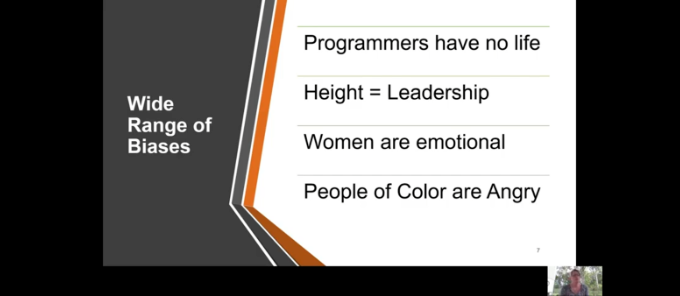As we count down to Open Mainframe Summit 2022, hosted virtually and in-person in Philadelphia, PA on September 21-22, we are looking back at some of our favorite presentations from last year’s Summit.
In his Open Mainframe Summit 2021 session, Misty Decker, a member of the Open Mainframe Project Governing Board and a Director of Worldwide AMC Product Marketing at Micro Focus, speaks about avoiding unconscious bias in order to become a better colleague. Misty has a passion for helping people, combined with a habit of over-researching things. She shares a blend of her personal thoughts on the topic and what she has learned by reading. Watch the video or read the summary below:
You Are Biased
Misty starts by asking a riddle. A father and son are in a car crash. The father dies, but the boy lives and goes to the hospital. In the operating room, a doctor says, “I can’t operate on the boy since he’s my son.” How’s this possible?
She’s asked this riddle to many people she’s met. Most of them can’t imagine that the doctor could be the boy’s mother.
Research says that we make 90% of our decisions unconsciously. The brain can only process 40% of the 11 million pieces of information we receive every second. Assuming things is literally a matter of survival. We can’t function if we have to analyze every piece of information we receive. Our assumptions are based on images we are familiar with. Twitter found that they have a biased image algorithm based on an existing dataset, which works just like our brain.
Our brain is trained on biased data. Since there are already existing disparities in society, biases have become part of our brain. We need to understand that fact before we can counter the effect. Having unconscious biases doesn’t make someone a bad person. However, the bad thing is if we hang on to those biases even after realizing they exist. The best thing for counteracting our biases is to actively try to discover them. Misty discusses a few examples of some common biased thoughts.

For example, a bias that programmers have no life makes managers assume that the programmers can work on weekends and nights.
If you assume that you don’t have biases, it’s bad news for you, as well as the people around you.
Are You Afraid of Being Accused?
Are you afraid that people may see you as biased? Do you worry that it will ruin your career and reputation? This fear to do the right thing can lead to a bad outcome. Eventually, you may end up avoiding people of color or women in your organization. This will prevent your coworkers from contributing fully. For fear of saying something upsetting, you might end up never getting to know your colleague.
However, a solution begins when there is awareness. Misty suggests some of her favorite actions, which are as follows.
Pay Attention
The first step is to pay attention and recognize your bad habits. Ask yourself, Would I respond differently if a statement is coming from someone else? Even if you don’t agree with someone, communicate in a way so that the other person feels comfortable.

Believe Them
Believe your colleagues. Many unconscious biases come from mansplaining or correcting your colleagues while assuming that you have more knowledge than someone who is speaking to you.
Ask Questions
Most people are happy to answer questions if asked respectfully. For example, if you want to know about a Black woman’s hair, you should ask, “Excuse me, would you be willing to explain some things about Black women’s hair?”
Again, some people might not be comfortable representing their entire diversity group and will avoid the question. To open the conversation, try simple questions like “I’d like to learn more about the biases that you encounter.”
Respect Their Boundaries
Remember, everyone has different preferences and boundaries. If a woman says she doesn’t feel included if you call the group “you guys,” accept her preferences. What matters is that she should feel included. Your colleagues and everyone else have a right to be treated as per their preferences.
Speak Up
Biases will continue unless we speak up and educate people around us. Whenever you see a bias, speak up. Take into account the people involved and the situation. Respectfully try to educate the biased person. Finally, speak up for yourself. Let others know about your preferences.

Actively Redefine Normal
Increasing diversity is the best way to reduce unconscious bias. When your surrounding becomes more diverse, your brain will learn to assume that is normal and stop making false assumptions.
Train Your Brain
Just as you work your muscles by weight lifting, train your brain by exposing yourself to diversity. If you are a man, attend tech events for women. If you are a white person, go to events empowering people of color. Read about and study issues. Talk to people who are not like you.
Wrapping Up
Finally, Misty concludes by speaking about “Women of COBOL,” a TechChannel series aimed at dispelling unconscious bias about women in COBOL and IT.
This post was written by Arnab Roy Chowdhury. Arnab is a UI developer by profession and a blogging enthusiast. He has strong expertise in the latest UI/UX trends, project methodologies, testing, and scripting.